

Per- and poly-fluoroalkyl substances (PFAS) are receiving increasing attention from regulators and the media. Within this large group of compounds, much of the focus has been on two long-chain compounds that are non-biodegradable in the environment: PFOS (perfluorooctane sulfonate) and PFOA (perfluorooctanoic acid). Long detected in most people’s bodies, research now shows how “forever chemicals” like PFAS accumulate and can take years to leave. They persist even when excreted through urine. Scientists have even tracked them in biosolids and leafy greens like kale. Recent studies have linked widely used PFAS, including the varieties called PFOA and PFOS, to reduced immune response and cancer. PFAS have been used in coatings for textiles, paper products, cookware, to create some firefighting foams and in many other applications.
Testing of large public water systems across the country in 2013 through 2015 found PFAS detected in approximately 4 percent of the water systems, with concentrations above the USEPA drinking water health advisory level (70 parts per trillion) in approximately 1 percent (from ITRC Fact Sheet.) Sources of higher concentrations have included industrial sites and locations were aqueous film-forming foam (AFFF) containing PFAS has been repeatedly used for fire fighting or training.
Source identification is more difficult for more widespread low-level PFAS levels. For example, in Madison, Wisconsin, PFAS have been detected in 14 of 23 municipal water supply wells, but the detected concentrations were below the USEPA’s health advisory levels for PFOA and PFOS. A study of potential PFAS sources near two of the Madison wells identified factories, fire stations, landfills, and sludge from sewage treatment plants as possible sources, but did not identify a specific source.
With the EPA positioned to take serious action on PFAS in late 2019 and 2020, regulators in many states have already started to implement their own measures, while state and federal courts are beginning to address legal issues surrounding this emerging contaminant. State actions have resulted in a variety of state groundwater standards for specific PFAS compounds, including some that are significantly lower than the USEPA advisory levels. These changes mean new potential liabilities and consequences for organizations that manufacture, use, or sell PFAS or PFAS-containing products, and also for the current owners of properties affected by historic PFAS use.
Questions for manufacturers, property owners, and property purchasers include:
If remediation is required, a number of established options to remove PFAS from contaminated soil and groundwater are available, including activated carbon, ion exchange or high-pressure membrane systems. On-site treatment options, including the management of reject streams where applicable, are also available.
Do You Need Help?
Need assistance with PFAS or have an idea that you would like to discuss? Contact for more information.
Use these resources to explore more about PFAS each is linked to helpful articles and information.
SCS Engineers welcomes Mark Pearson, P.E, to the firm’s environmental engineering practice. As a Project Director, he and his team will provide water and wastewater engineering and consulting to public and private entities in the region and the U.S. from SCS’s Overland Park office.
Mark brings decades of expertise in environmental engineering, with an emphasis on wastewater design for water treatment plants, wells, pumping stations, and including sewers and waterlines. His experience includes project management through facility planning, design, and construction phases; a good fit for SCS’s comprehensive solutions.
A Professional Engineer licensed in three states, he supports clients with the design, construction, and implementation of environmental treatment systems for water and wastewater plants and post-industrial use, reuse, and the disposal of liquids. Mark helps support industries and landfills facing increasing regulatory policies, higher standards required by water treatment plants, and the rising costs associated with protecting water supplies.
Mark has worked on a wide range of projects around the world and in the United States. He is a certified Envision Sustainability Professional (ENV SP) and a member of the National Council of Examiners for Engineering and Surveying (NCEES). He earned his bachelor’s degree in civil engineering from the Missouri University of Science and Technology, and his master’s degree in environmental engineering from California State University-Long Beach.
“Mark’s expertise and knowledge enhance SCS’s ability to provide sustainable process treatment design and wastewater solutions to industrial and landfill clients who are responsible for leachate and liquids management, which is a significant operational expense for them,” stated Nathan Hamm, a Vice President of SCS Engineers and Central region lead in the Liquids Management program.
Bill Lape discusses the most frequently asked questions about designing a training program that is part of your facility’s PSM and RMP programs and provides a defensible position during inspections while ensuring that your facility operators and maintainers perform their jobs safely.
Bill tackles all your questions in this article. Set-PSM-RMP-Hut-Hut
SCS Engineer’s Long Beach Headquarters sponsored and participated in the U.S. Vets Storm the Beach 5K/10K Run, Walk & Roll for Veterans event in Long Beach, CA.
U.S. Vets is an impressive organization supporting our Veterans in Long Beach, many of whom are homeless. These men and women who have served our country receive housing, employment opportunities, and counseling services from this private non-profit organization.
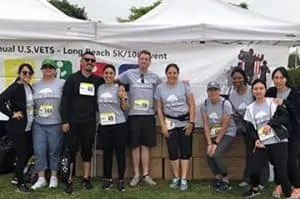
Visit our website and look for careers with our award-winning team of professionals.
SCS Engineers’ Arizona office is continuing to grow with the addition of Dana Justice, a marketing specialist, who previously worked at the award-winning firm’s office in San Diego.
“Dana brings fresh ideas, strong problem-solving skills, and creative business development tactics to the Arizona office,” said Dan Sola, Arizona project director of SCS Engineers.
Justice is responsible for supporting marketing and business development in Arizona, Nevada, and California for environmental services. Her job responsibilities include engaging in business development outreach and continuing to strengthening the firm’s client success culture. As an employee-owned environmental consultant and contractor, SCS excels at accomplishing specific technical needs and high quality but also strives to provide a superior working relationship with their clients.
“SCS has great company culture with a sense of family among the staff,” Justice said. “I’m thrilled to take on a larger role in the Southwestern region and new responsibilities at SCS.”
Justice earned a bachelor’s and master’s in business administration from California State University San Marcos. She lives in Mesa.
The Arizona office has completed 3,500 projects during the last 30 years for the solid waste industry, government, and other industries responsible for safeguarding the environment as part of doing business.
Wendell, a Senior Project Professional in the SCS Engineers Sacramento office became interested in photography 35 years ago. He had broken his ankle and needed something to do because he felt grumpy not being able to play tennis. His tennis partner loaned him a camera, some film, and his dark room.
Wendell was hooked.
Wendell’s beautiful photos capture the reason we work with our clients to protect our environment. See a few pieces of his organic work, and look for more soon.
Mr. Minshew has over 30 years of engineering experience. He specializes in civil engineering services in the planning, design, permitting, and construction management of solid and hazardous waste facilities. He is a licensed Professional Engineer in California and Nevada.
Thank you for sharing, Wendell.
An environmental insurance claim is simply the response and mitigation of an environmental issue or event paid for by an environmental insurance policy. Similar to an auto or home insurance claim, a company or individual purchases this type of policy to protect them in case a matter arises about their facility, operations, or property resulting in a regulatory requirement for investigation and remediation; forming the basis for a submitted claim. Such responses cost money, often a lot of it, and the environmental insurance policy is there to pay for the costs associated with the investigation and remediation of any environmental issues.
Any environmental issue can result in an environmental claim, so it is essential that you have the right policy in place to cover a particular claim. Typical issues or events include:
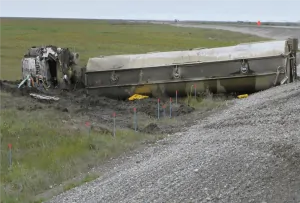
Insurance clients submit notice to the insurance company that an environmental issue occurred or was discovered which requires investigation and corrective action. The onus is on the client to provide sufficient information to substantiate a claim submittal. The insurance company reviews this information in their evaluation of coverage for the issue under the policy.
When a new claim is submitted to the insurance company, the client must provide information that substantiates that an issue exists and that further investigation and corrective action is required. Often their substantiation consists of the initial technical details about the nature and extent of the environmental problem. Claims analysts generally have a strong legal background but may lack technical environmental expertise; this is when insurance support services become valuable. The following paragraphs summarize each step in the process and how SCS insurance support assists claims analysts through the process.
Once the insurance company receives a notice of claim, they determine whether the client’s policy provides coverage for the specific issue or event that constitutes the claim. A claims analyst evaluates the specifics of the claim to determine if the associated details and circumstances fall within the specifics of the client’s policy. If so, coverage is usually accepted. If not, coverage is generally denied.
SCS’s role is to provide an evaluation of the technical aspects of the claim so that the claims analyst can take the distilled facts and compare them against the specifics of the policy; often called a “Source and Timing” evaluation. Take, for example, an underground storage tank (UST) release at a gasoline station. In this example, free product (gasoline) is observed in an on-site monitoring well where no free product has previously or recently been identified.
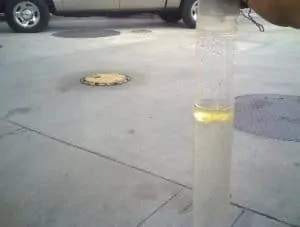
The station owner or their environmental consultant reports the apparent new release to the regulator, and a confirmed discharge is recorded. The property owner than notifies the insurance company of a gasoline release to the environment.
As part of the “Source and Timing” evaluation, SCS’s insurance support reviews tank system leak detection and inventory records, tank system tightness testing records, previous groundwater monitoring data, reports of any earlier releases at the facility, and any other information or data about the facility and the subject release. The goal is to identify:
If enough information is available to make these determinations, then the claims analyst compares the SCS report to the coverage specifics and exclusions included in the policy; determining if the event is covered. The claims analyst will usually try to make a coverage determination on their own if the facts are relatively straightforward, but often that is not the case, and the assistance of insurance support services is necessary.
This process can be straightforward, such as in the case of a tanker truck rollover or industrial facility chemical spill, but is often more complicated when insufficient information is available to make a source and timing determination. In the latter case, the claims analyst issues a Reservation of Rights letter, stating that the insurer is not accepting or denying coverage at this time as the circumstances of the claim are still under evaluation and investigation.
Claims can be denied if the incident occurs before or after the policy period; if the source or type of incident are not included or are specifically excluded under the policy; or if the incident occurred because of the client’s negligence. If coverage is denied no further actions are generally necessary on the part of the insurance company. Whether a claim is accepted or denied is often more complicated than what we’ve discussed here.
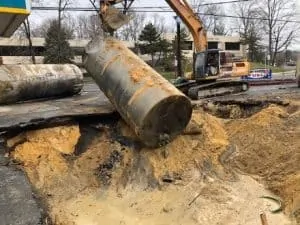
The claim is accepted; undoubtedly good news for the client. What happens now is that the claim becomes “Active,” requiring among other things for the claims analyst to set reserves. A reserve is an estimate of what the claim is going to cost the insurance company. Your insurance support consultant can provide a rough approximation of the estimated costs to achieve regulatory closure, which includes all expenses incurred from investigation through remediation, post-remediation monitoring and reporting.
Early in the life of a claim, these are preliminary estimates that are refined as a project progresses, often requiring the claims analyst to adjust their reserves; important to the insurance company as future reserves impact financial forecasts. Insurance support services will develop the cost-to-closure estimate based on all available information and data, as well as their professional experience on similar projects. The insurer wants the most experienced environmental consultants and engineers on the case because their estimates are more likely to be on target and identify potential regulatory issues or risks.
From the insurer’s standpoint, the primary goal is to maintain a high level of responsiveness to their clients and process requests for reimbursement against the claim. The role of your insurance support team can continue by managing quality control and evaluation of site-specific activities; ensuring that the investigation and cleanup are reasonable and appropriate given the environmental conditions at the site, all applicable regulatory requirements, and costs consistent with industry standards for recovery. The client and their environmental consultant are required to provide the insurer and the insurance support consultant documentation of the work as follows:
Over the life of a claim, insurance support may correspond with the project consultant on behalf of the insurer, conduct site visits, and be asked to participate in meetings, conference calls, and mediations. The overall goal of your insurance support consultant is to assist claims analysts in closing a claim in the most time-efficient, cost-effective manner possible within all regulatory rules and guidelines.
Once an active claim−environmental project has achieved regulatory closure, the claims analyst begins the administrative process of closing the claim. From SCS’s insurance support standpoint, all that remains is to obtain the appropriate documentation from the regulator confirming that the subject project is approved for closure and that no further actions are required.
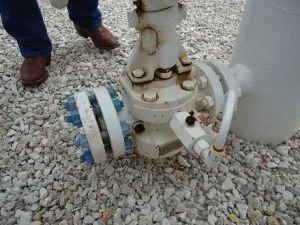
There are other circumstances which may result in closing a claim, such as exceeding the maximum total cost that can be paid out by the policy, non-compliance with policy requirements, or new information coming to light which results in a change in coverage position by the insurer. In some cases, such as when there is a change in coverage position or the cause of the issue can be attributed to a third party equipment failure, the insurer may seek to recover costs expended from the client and third-party policies. That process, called subrogation, may require the expertise of your insurance support specialist and at times their testimony as an expert witness.
There are several ways that SCS helps our insurance clients and other clients. The involvement of insurance companies is becoming more pervasive throughout environmental consulting and engineering in all business sectors. The combination of SCS’s industry expertise, contacts associated with our insurance support services, and our Federal, State, and local level regulatory expertise brings more knowledge and efficiency to each project. SCS offers a wide range of engineering and environmental services, a national presence, and a positive established industry reputation.
Our clients appreciate being able to draw upon our insurance-related expertise to assist them with their submittals, interpreting insurance requirements, and liaising with insurance companies as part of our core capabilities.
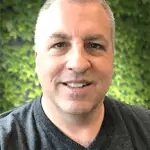
Mr. Michael Schmidt is an accomplished industry leader with nearly 30 years of progressively responsible experience in the environmental consulting and environmental insurance industries. He has specific expertise focusing on the evaluation of environmental risks and liabilities associated with insurance claims and underwriting, site investigation and remediation, due diligence, and project management.
Feel free to use our website to share our blogs, whitepapers, case studies, events, and news. SCS respects your privacy.
Next year… 2020 will be the 30th year of SCS Engineers keeping roads in Madison, WI. clean.
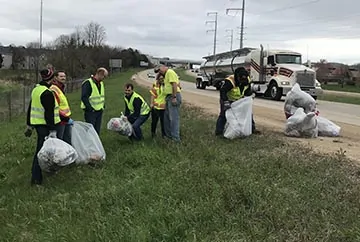
Christina Finizio, a recent graduate from the University of Florida now holds a Bachelor of Science in Environmental Engineering. Her journey with SCS began last summer when she joined the Boca Raton team as an Intern. Christina did not always know she would become an engineer, she thought she would study International Business just like her sister, but that quickly changed.
In high school, she attended a Hackathon event that took place in San Francisco, and that is when her interest in engineering began. In this event, she got a glimpse of computer science and other areas; her instincts kept drawing her to engineering. She looked at her options, and many did not seem appealing to her until she looked into environmental engineering. It ultimately made sense to go that route; she always had an interest in the environment and was the President of the Environmental Club in high school.
While in college, she participated in an exchange program and flew out to Madrid for the spring semester. Her experience was unforgettable. During this time, she made friends from all over Europe and the world, improved her Spanish and explored the world of tapas. While there, she took care of business and had an internship with Sacyr’s (Valoriza Servicios Medioambientales), a construction firm, where she joined their Environmental Engineering group. Her internship focused on environmental and solid waste. This was the first time she was exposed to the solid waste industry, and where her interest grew.
After completing her exchange and internship program, she arrived home with a clear idea and knowledge of what she wanted to do next. She did her research and found a well-known professor who teaches and researches in solid waste at her university. She took his classes and studied with his group so she could become more knowledgeable.
Christina is was involved on campus and joined many student organizations. At one of the Society of Women Engineers’ (SWE) event, she met SCS’s Director of Talent Acquisition, Jennifer McCafferty. Christina was interested in SCS’s work and kept in touch with Jennifer. The following summer she applied to SCS’s internship program and was offered an internship in the Boca Raton, Florida office. She enjoyed the experience because it focused on solid waste management her primary area of interest.
Shortly after graduating, Christina joined the SCS team as an Associate Professional at the Tampa, Florida office. She loves the culture, and enjoys working with her team; they are exceptionally friendly and are always willing to lend a hand. She feels her success is in part, due to her team’s focus on their clients’ needs and believes this focus and the team’s communication style is valuable to clients, her team and herself.
Every day her work is different; she can be out in the field one day and in the office the other. She works on a variety of reports such as annual air monitoring and greenhouse gas reports; performs construction oversite for gas systems and system expansions. Her internship and new responsibilities give her a deeper understanding of the solid waste business, and how landfill gas can become a renewable energy resource rather than an environmental impact.
One of her biggest challenges is being able to imagine or see what is going on in the landfill. Landfills are complex requiring environmental monitoring and multiple systems for continuous protection; no doubt that Christina will continue to learn from the best in the business and continue to excel as an Associate Profesional.
Her advice to new interns is to always ask for help when you need it and offer support to those around you. You will be surprised how much you will learn from different areas and how friendly and willing to mentor everyone is. She feels this mantra was what prepared her for her current position.
Fun facts you should know about Christina; that she loves to salsa dance, cook, and travel. She is the first one in her immediate family to hold a degree in engineering and the STEM field. Christina is a valuable member of the SCS Tampa office team and the firm.
SCS Engineers is fortunate to include Christina and our many other Young Professionals at SCS on our teams.
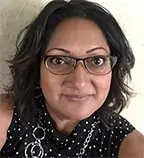
Depi holds a BA from UC Irvine and is active in the Society of Marketing Professional Services, Association of Proposal Management Professionals and the Business Development Association of Orange County. She is also a former member of the Professional Environmental Management Association.
Jed Douglas, a senior project advisor, brings more than 20 years of experience in project management, health and safety, air quality and more. He will direct and develop SCS’s industrial hygiene practice in the Southwest region leading business development and client service, managing projects, and managing staff. Jed is a certified industrial hygienist and safety professional, and an accredited U.S. Green Building Council LEED Professional.
In the community, Jed has served on the board of the Big Brothers and Big Sisters of the North Coast, the board of the Humboldt Area Saltwater Anglers, and as Editor of the Humboldt Bay Mycological Society newsletter.
Welcome to the SCS team – driven by client success!